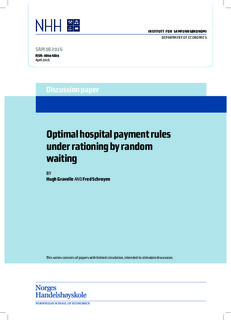| dc.contributor.author | Gravelle, Hugh | |
| dc.contributor.author | Schroyen, Fred | |
| dc.date.accessioned | 2016-05-19T09:17:50Z | |
| dc.date.available | 2016-05-19T09:17:50Z | |
| dc.date.issued | 2016-05-19 | |
| dc.identifier.issn | 0804-6824 | |
| dc.identifier.uri | http://hdl.handle.net/11250/2389698 | |
| dc.description.abstract | We derive optimal rules for paying hospitals in a public health care system
in which providers can choose quality and random patient demand is rationed by waiting
time. Since waiting time imposes real costs on patients hospital payment rules should take account of their e¤ect on waiting time as well as on quality and the number of patients treated. We develop a general stochastic model of rationing by waiting and use it to derive welfare maximising payment to hospitals linked to output, expected waiting times, quality, hospital capacity and length of stay. We show that, although prospective output pricing gives hospitals an incentive to attract patients by raising quality and reducing waiting times, it must be supplemented by prices attached to other hospital decisions and outcomes except under very strong assumptions about the welfare function, patient preferences, and whether patients lose income whilst waiting. | nb_NO |
| dc.language.iso | eng | nb_NO |
| dc.relation.ispartofseries | SAM;8/2016 | |
| dc.subject | Rationing. Waiting times. Queues. Prospective payment. Hospitals. | nb_NO |
| dc.title | Optimal hospital payment rules under rationing by random waiting. | nb_NO |
| dc.type | Working paper | nb_NO |
| dc.subject.nsi | VDP::Social science: 200::Economics: 210 | nb_NO |
| dc.source.pagenumber | 51 | nb_NO |
